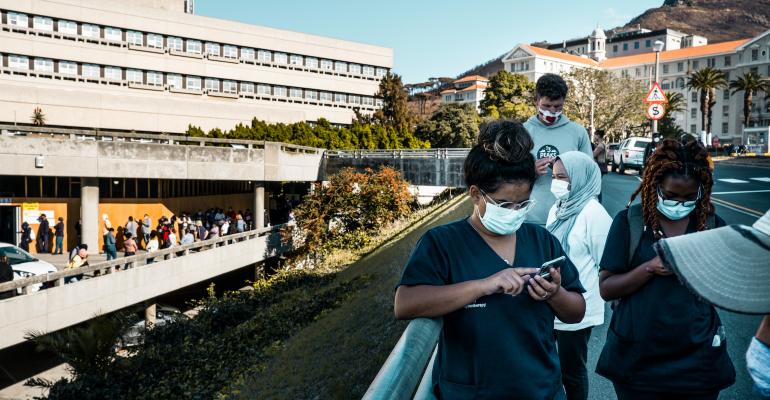Digital implementation in health services can provide faster and more efficient ways to care for patients. However, it requires a collaboration of knowledge between the patient, professional and healthcare organisation, said Prof S Yunkap Kwankam, CEO, Global eHealth Consultants; Executive Director, International Society for Telemedicine and eHealth (ISfTeH); and Chairman of Telenethealth International.
An advocate for implementing digital health solutions in healthcare, Prof Kwankam elaborated on Africa-specific challenges and opportunities in his Africa Health talk Emergence of eHealth / Digital Health solutions – related opportunities and challenges.
He described how Africa with the Middle East accounts for less than 5 percent of the global mobile health app market, the biggest digital health subset: a "sliver" while nonetheless a "significant" share. IoT, AI, blockchain and AR will spur further mobile app growth in the future.
Digital health opportunities in African health systems include extending the catchment area of hospitals, reaching the previously unreached, and leveraging people.
A digital health ecosystem should fully support integrated people-centred health services, at all levels of the healthcare pyramid, from the home and community, to clinics to hospitals to academic centres.
There remain traditional problems, such as creating integrated digital health systems and going to scale with digital health interventions, but there is also an emerging challenge: cybersecurity.
Prof Kwankam spoke of specific cybersecurity issues in African health systems such as out of date systems, siloed health solutions, and insufficiently trained staff, both at Ministry of Health level and within the international development community.
How to optimise health technology access and impact in Africa
Speaking during the panel session Critical supporting roles for optimised health technology access and impact in the African Region, Anna Worm, an independent advisor on biomedical equipment challenges, said that access to healthcare technology (the right equipment available on site) depended on a national, regional or facility-developed Standard Equipment List related to the essential care package. Once this aspect is clear, it’s possible to begin planning.
The impact of health technology depended on “trained, motivated and enabled medical and non-medical staff - and as long as people are not paid regularly, motivation is difficult,” she added.
She explained further that there needed to be political will, budgets, policies and guidelines. Two out of three are often lacking in the countries where she works.
Other speakers said that while technology was essential to the healthcare system, professionals must learn how to use and respect it.
Ashenafi Hussein, Chair, IFMBE Working Group on African Activities-WGAA, said that one of the biggest challenges in adopting healthcare technology was what he described as a professional and structure issue.
“We’ve had challenges with professionals not handling technology. Most of the technology is handled by pharmacists, doctors, or non-medical engineers, for maintenance, procurement or regulation for example,” he said.
There is also a shortage of professionals in handling the equipment, and understanding its usage, he explained. “We don't have as many professionals as possible in order to access health technology,” he said.
In addition, there exists poor regulation of health technology in Africa, hence professionals cannot deliver, and an absence of a clear health technology policy, in relation to assessment and procurement for example, in many African countries.
“I personally recommend a health technology policy…and a proper knowledge and health technology transfer... and it would be great to have a proper organisational structure to benefit professionals,” Hussein added.
On his part, medical physics and biomedical engineering consultant Mario Forjaz Secca said that there needed to be more collaboration between Ministry of Health and Medical Device Department (MDD) of the WHO.
He explained that it was vital to focus on procurement by involving professionals such as medical doctors rather than Ministry of Health alone.
Everyone furthermore needed to be trained. “What I have been finding in Mozambique is that people who have been working in hospitals have no real respect for medical equipment. They treat the CT equipment as if it were a bed, with no respect whether it were broken or not,” he said.
Register to attend Africa Health 2021 (25-29 October 2021) for free.

